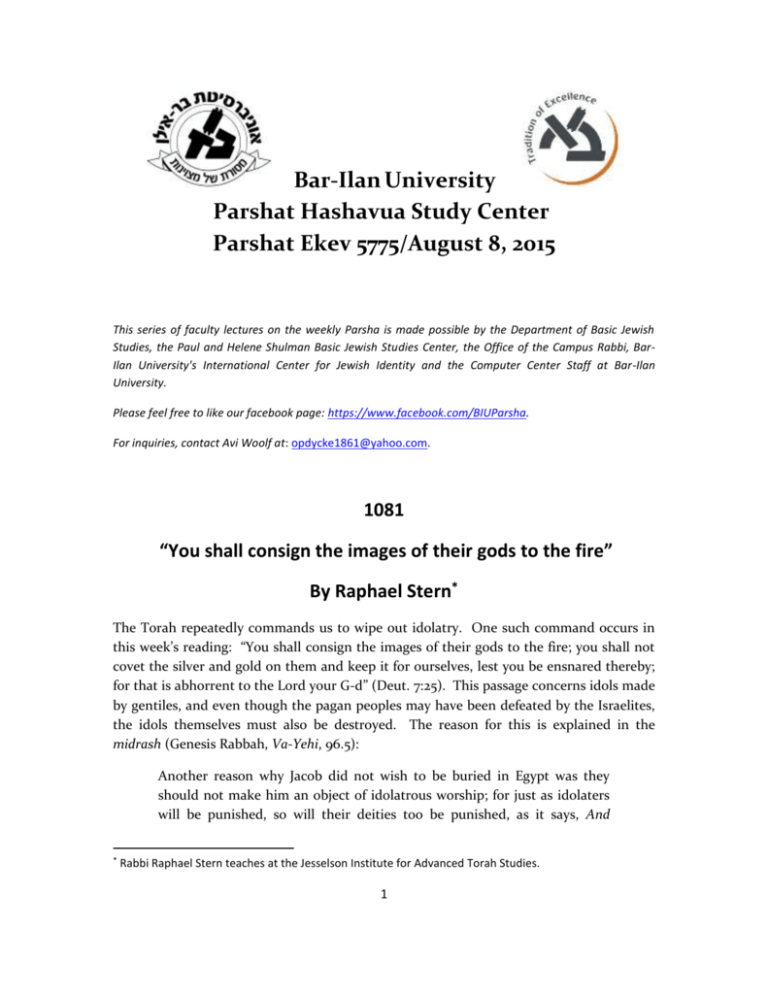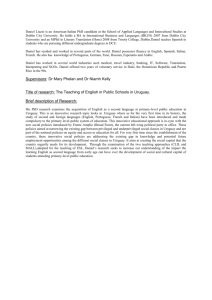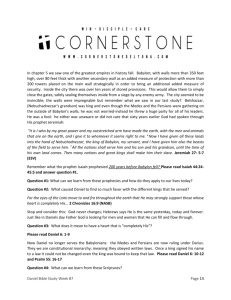You shall consign the images of their gods to the fire
advertisement

Bar-Ilan University Parshat Hashavua Study Center Parshat Ekev 5775/August 8, 2015 This series of faculty lectures on the weekly Parsha is made possible by the Department of Basic Jewish Studies, the Paul and Helene Shulman Basic Jewish Studies Center, the Office of the Campus Rabbi, BarIlan University's International Center for Jewish Identity and the Computer Center Staff at Bar-Ilan University. Please feel free to like our facebook page: https://www.facebook.com/BIUParsha. For inquiries, contact Avi Woolf at: opdycke1861@yahoo.com. 1081 “You shall consign the images of their gods to the fire” By Raphael Stern* The Torah repeatedly commands us to wipe out idolatry. One such command occurs in this week’s reading: “You shall consign the images of their gods to the fire; you shall not covet the silver and gold on them and keep it for ourselves, lest you be ensnared thereby; for that is abhorrent to the Lord your G-d” (Deut. 7:25). This passage concerns idols made by gentiles, and even though the pagan peoples may have been defeated by the Israelites, the idols themselves must also be destroyed. The reason for this is explained in the midrash (Genesis Rabbah, Va-Yehi, 96.5): Another reason why Jacob did not wish to be buried in Egypt was they should not make him an object of idolatrous worship; for just as idolaters will be punished, so will their deities too be punished, as it says, And * Rabbi Raphael Stern teaches at the Jesselson Institute for Advanced Torah Studies. 1 against all the gods of Egypt will I execute judgments (Ex. 12:12). You find similarly in the case of Daniel. When he interpreted Nebuchadnezzar’s dream, what is said? Then the king Nebuchadnezzar fell upon his face, and worshipped Daniel and commanded that they should offer an offering and sweet odors unto him (Dan. 2:46). He indeed commanded that they should offer to him, but Daniel declined it, saying, Just as idolaters will be punished, so will their gods be punished. Nebuchadnezzar, King of Babylon, prostrated himself before Daniel and wished to make offerings and sacrifices to him, but Daniel refused because the Holy One, blessed be He, exacts punishment not only from idolaters, but also from the idols themselves. Thus, in the plagues against Egypt, the Holy One, blessed be He, smote not only the Egyptians but also the gods of Egypt, even striking them first: “Because rain does not fall in Egypt, rather the Nile rises and irrigates the land, and the Egyptians [on this account] worshipped the Nile, therefore, G-d first smote their deity and afterwards smote them” (Rashi on Ex. 7:17). Punishing the object of idolatry is not only given to the hands of the Holy One, blessed be He, but also made incumbent upon us in the commandment to destroy idolatry and consign it idols to the fire, as explained in the above-cited verse from this week’s reading. Daniel, knowing that the Holy One, blessed be He, punishes not only idolaters but also that which they worship, did not consent to Nebuchadnezzar making him offerings and sacrifices. Notwithstanding his refusal, the very fact that Nebuchadnezzar viewed Daniel as a deity and bowed down to him—albeit contrary to Daniel’s wishes—caused Daniel not to fall into the fiery furnace, in contrast to his fellows Hananiah, Mishael and Azariah, who went into the furnace and emerged unscathed. An explanation of this is given in Sanhedrin 93a: Our Rabbis taught: Three were involved in that conspiracy [to keep Daniel out of the furnace]: The Holy One, blessed be He, Daniel and Nebuchadnezzar. The Holy One, blessed be He, said: “Let Daniel depart hence, lest it be said that they were delivered through his merit.” Daniel said: “Let me go from here, that I be not a fulfilment of ‘You shall consign the images of their gods to the fire.’” Whilst Nebuchadnezzar said: “Let Daniel depart, lest people say he [Nebuchadnezzar] has burnt his god in fire.” And whence do we know that he worshipped him?—From the verse, Then King Nebuchadnezzar prostrated himself and paid homage to Daniel (Dan. 2:46). In other words, Daniel feared that if he were to enter the fiery furnace he might not be saved, since he deserved punishment, for the Holy One, blessed be He, punishes “that which is worshipped.” Even though Daniel surely did not wish for Nebuchadnezzar to see 2 him as an object of pagan worship, he feared for himself. It seems that Daniel feared unnecessarily, since that which he feared was against Nebuchadnezzar’s desires, but in the midrash, Daniel’s fears are presented as being well-founded (Numbers Rabbah, Naso 13.4): For what reason was Daniel saved from the lions? Because he offered prayer to the Holy One, blessed be He…Why was he not cast into the furnace? Because he was Nebuchadnezzar’s god, as it is written, The king…worshipped Daniel, and commanded that they should offer an offering and sweet odors unto him (Dan. 2:46). Another explanation is that he would have been burned; for it is written, The graven images of their gods shall ye burn with fire (Deut. 8:25). For this reason the Holy One, blessed be He, put it into the heart of Darius not to cast him into the fiery furnace, in order to make known His power. Even though Daniel was delivered from the lions’ den, had he been thrown into the fiery furnace he would not have been saved, since Nebuchadnezzar had made a god of him, and the law is that gods be burned in the fire. One might wonder why Daniel should have been punished. After all, he surely did not want Nebuchadnezzar to make him the object of pagan worship. Just as he merited being saved from the lions’ den, why should his merits not have stood him in good stead to save him from the fiery furnace? The answer, as pointed out above, is that the Holy One, blessed be He, also exacts punishment from that which is worshipped, even though it is surely not to blame for being worshipped. The Holy One, blessed be He, exacts punishment from whomever or whatever leads a person into error, albeit through no fault of its own. This is explained in Tractate Semahot, chapter 8: Homiletical exegetes would say: “Tear down their altars,” but what sin did the trees and stones commit? Rather, since a person committed an offense through them, Scripture therefore said to tear down their altars. Arguing by inference from minor to major, if it says “you shall tear down their altars” when trees and stones—which have no merits nor points to their discredit and which can be said to be neither good nor bad—cause a person to commit an offense, how all the more so a person, when he causes his fellow to sin and leads him from the path of life to the path of death. Similarly, “you shall kill the woman and the beast” (Lev. 20:16). While the woman sinned, how did the animal sin? Rather, since a human being committed an offense through the animal, Scripture says “and the beast,” lest the beast walk through the market and people say: There goes the beast on account of which so-and-so was killed. 3 Now let us return to Daniel. Surely he would not have been punished, for he himself prevented Nebuchadnezzar from making him offerings and sacrifices. However, had Daniel been thrown into the fiery furnace, he would not have merited miraculous deliverance since ultimately Nebuchadnezzar perceived him as the object of pagan worship and bowed down to him. That being the case, he did not merit the name of Heaven being sanctified through him and being saved from the fire; this was by way of punishment being exacted from the object of pagan worship. We add one more reason for this, based on Sefer Hassidim: If gentiles should happen to call a Jew by the name of one of their gods, he should not let them call him that; for it is said (Ezekiel 28:3): “Yes, you are wiser than Daniel.” You are wiser than Daniel, spelled Danel, without a yod, since Daniel protested to Nebuchadnezzar against making him into a god but did not protest against his calling him Belteshazzar, as his gods were called. (Sefer Hassidim, Margaliyot ed., par. 194) The argument made against Daniel is that he allowed Nebuchanezzar to change his name to that of a god (Belteshazzar), and therefore he was punished by having the letter yod removed from his name. One could say that in order for the Lord’s name to be sanctified by the miracle of being delivered from the fiery furnace, the person must have a perfectly clean slate. But Daniel, who did not oppose Nebuchadnezzar calling him by the name of a deity, was not privileged to sanctify the name of the Holy One, blessed be He, by emerging unscathed from the furnace. Therefore, the Holy One, blessed be He, caused Daniel not to be placed in that position. Translated by Rachel Rowen 4







